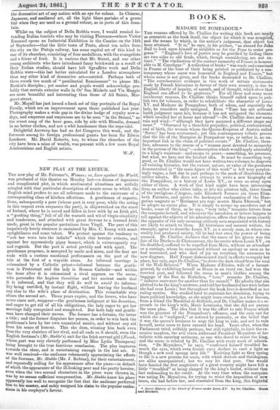NEW PLAY AT THE LYCEUM.
THE new play of Mr. Falconer's, Woman; or, Love against the World, was produced at this theatre on Monday last—a drama of ingenious
and complicated plot, in which sentimental situations are artfully mingled with that particular description of comic scene in which the English mind prefers to see all reference made to the existence of a corresponding class of kitchen affections. A gentleman of expeeta_ tions, subsequently a peer (whose part is very poor, while the acting in this respect even surpasses the part), is shipwrecked on the coast of Ireland, where he is saved and fallen in love with by an Irish girl, a "gushing thing," full of all the warmth and wit of virgin simplicity and tenderness, and attached with great fervour to a learned Irish uncle, great in the popular quotations from Virgil. The part of this impulsively lovely creature is sustained by Mrs. C. Young with much sprightliness and some talent. We protest against the tendency to "sob her woes into the infinite" which this heroine evinces, and against her oppressively gipsy bonnet, which is extravagantly coy and roguish. But the part is acted prettily and with spirit. The gentleman propoSes, is accepted by uncle and niece, and the first act ends with a curious emotional performance on the part of the trio at the foot of a wayside cross. An informal marriage is solemnized by a Catholic priest—informal because the gentle- man is Protestant and the lady is Roman Catholic—and within the hour after it is solemnized a rival appears on the scene, who persuades the hapless Geraldine and her ancient uncle that it is informal, and that they will do well to avoid its informa- lity being rectified, by instant flight, without leaving the husband any clue to the wife's place of destination. This remarkable step closes the second act. Three years expire, and the lovers, who have never since met, reappear—the gentleman indignant at his desertion, and eager to get rid of all his obligations, the lady eager to get her marriage fully recognized and completed. But both lady and gentle- man have changed their names. The former has a fortune, the latter a title; and the former disguises her person, in order to win back the gentleman's love by her own unassisted merits, and without any aid from his sense of honour. This she does, winning him back even from the very clutches of her rival, and all ends as it should, even the English footman's (Hr. Stubbs's) suit for the Irish servant girl (Norah, whose, part was very cleverly performed by Miss Lydia Thompson) being brought to the true facetious conclusion. The play improves towards the close, and is entertaining enough in the last act. It was well received—the audience vehemently appreciating the efforts of the footman, Mr. Stubbs (Mr. J. Robins), for their entertainment, and repeatedly calling for his appearance after the piece—in default of which the appearance of the ill-looking peer and the pretty heroine, even when the two second characters in the piece were thrown in, was by no means sufficient compensation. Mr. Stubbs knew his place apparently too well to recognize the fact that the audience preferred him to his master, and nobly resigned his claim to the popular enthu- siasm in his employer's favour.






























 Previous page
Previous page